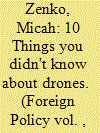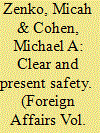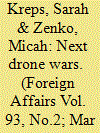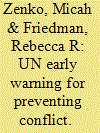|
|
|
Sort Order |
|
|
|
Items / Page
|
|
|
|
|
|
|
| Srl | Item |
| 1 |
ID:
110975


|
|
|
|
|
| Publication |
2012.
|
| Summary/Abstract |
In 1998, U.S. President Bill Clinton's administration shut down an operation to kill the al Qaeda leader in Afghanistan with cruise missiles, given collateral damage estimates of 300 casualties and only 50 percent confidence in the intelligence. As the 9/11 Commission noted, "After this episode Pentagon planners intensified efforts to find a more precise alternative." In 2000 and 2001, the U.S. Air Force struggled to reconfigure a Hellfire anti-tank missile to fit onto a Predator surveillance drone. Meeting one week before the 9/11 attacks, the National Security Council agreed that the armed Predator was not ready to be operationally deployed. The first known killing by armed drones occurred in November 2001, when a Predator targeted Mohammed Atef, a top al Qaeda military commander, in Afghanistan.
|
|
|
|
|
|
|
|
|
|
|
|
|
|
|
|
| 2 |
ID:
110926


|
|
|
|
|
| Publication |
2012.
|
| Summary/Abstract |
Last August, the Republican presidential contender Mitt Romney performed what has become a quadrennial rite of passage in American presidential politics: he delivered a speech to the annual convention of the Veterans of Foreign Wars. His message was rooted in another grand American tradition: hyping foreign threats to the United States. It is "wishful thinking," Romney declared, "that the world is becoming a safer place. The opposite is true. Consider simply the jihadists, a near-nuclear Iran, a turbulent Middle East, an unstable Pakistan, a delusional North Korea, an assertive Russia, and an emerging global power called China. No, the world is not becoming safer."
|
|
|
|
|
|
|
|
|
|
|
|
|
|
|
|
| 3 |
ID:
089958


|
|
|
|
|
| Publication |
2009.
|
| Summary/Abstract |
After September 11, 2001, President George W. Bush's administration presented a national security agenda that held two key goals: the denial of safe havens to terrorist groups with international reach, and the prevention of terrorist groups from acquiring Weapons of Mass Destruction (WMD). In 2002, a terrorist group, Ansar al-Islam, operating out of a camp in Khurmal, northeast Iraq, was reportedly developing cyanide gas, toxic poisons, and ricin for potential use against Europe and the United States. The Joint Chiefs of Staff unanimously supported, and formally presented to the White House, a military operation to destroy the Ansar camp. This article, based on research and interviews with senior military and civilian officials, assesses four plausible explanations for why President Bush deferred attacking the only place in Iraq that was producing WMD, albeit in small quantities, before the 2003 war. It argues that President Bush made the mistake of bypassing the Khurmal operation, because of concerns that it could have disrupted plans to remove Saddam Hussein from power. In addition, the article assesses what lessons learned from the decision not to attack Khurmal could be applied to other non-uses of limited force.
|
|
|
|
|
|
|
|
|
|
|
|
|
|
|
|
| 4 |
ID:
127927


|
|
|
|
|
| Publication |
2014.
|
| Summary/Abstract |
During World War II, a top commander in what was then the U.S. Army Air Forces, General Henry "Hap" Arnold, developed a new way to attack U-boat stations and other heavily fortified German positions: he turned old B-17 and B-24 bombers into remotely piloted aircraft and loaded them with explosives. "If you can get mechanical machines to do this," Arnold wrote in a memo to his staff, "you are saving lives at the outset." The missions had a poor track record, but that did not deter Arnold from declaring in 1945 that "the next war may be fought by airplanes with no men in them at all."
|
|
|
|
|
|
|
|
|
|
|
|
|
|
|
|
| 5 |
ID:
101812


|
|
|
|
|
| Publication |
2011.
|
| Summary/Abstract |
Despite repeated calls for a coordinated UN early warning system for preventing conflict, early warning is currently performed piecemeal by seven UN bodies and one ad hoc initiative. Due to the difficulties inherent in the UN's structure - the transparency of the organization and member states' sensitivity about perceived encroachments on their sovereignty - the UN cannot, and arguably should not, develop a comprehensive early warning system for preventing conflict. Instead, the UN could improve its ability to analyse and absorb early warning information already in the system by: reforming the Executive Office of the Secretary-General; strengthening the early warning and assessment capacities within the aforementioned bodies; soliciting greater cooperation with the US intelligence community and regional organizations; and promoting enhanced inter-agency cooperation.
|
|
|
|
|
|
|
|
|
|
|
|
|
|
|
|
|
|
|
|
|